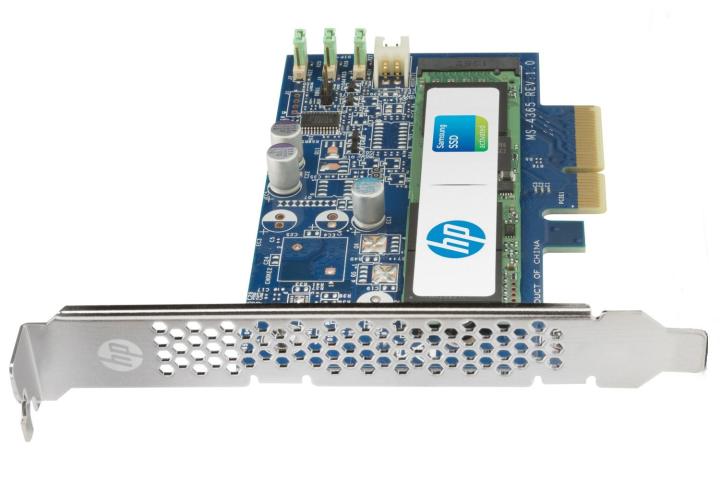
HP is rising to combat Intel with its Z Turbo Drive G2. In many ways the drive is very similar to the 750 Series. It comes as a PCI Express add-in card, it connects over the NVMe standard, and promises to be usable as a boot drive in any system that can handle NVMe drives.
There are some notable differences, though. Intel’s drive comes in 400GB and 1.2TB capacity, but HP is shipping in more traditional 256GB and 512GB capacities. That means the Z Turbo Drive G2 offers less space, but it may also make the drive more practical, as the large size of the Intel drives put them out of reach for some buyers. HP also won’t be offering a 2.5-inch version, as Intel does.
HP says the drives, which feature hardware built by Samsung, can deliver read bandwidth of up to 2,510 megabytes per second. Write bandwidth is quoted at 1,260MB/s for the 256GB model and 1,550MB/s for the 512GB version. The larger drive is also more durable. The 256GB is rated to endure 146 terabytes of writes, while its big brother can handle 292TB. With that said, neither drive is likely to fail under normal home use; these figures will only be relevant to enterprise buyers.
The bandwidth figures actually exceed the Intel 750 Series, which quotes read speeds no higher than 2,400MB/s for the 1.2TB model and write speeds no greater than 1,200MB/s. However, the Intel drives handle random reads and writes more quickly. HP’s Z Turbo Drive G2 can manage 300,000 read input/output operations per second (IOPS), but the 750 Series maxs out at 440,000.
Both drives are expected to become available in June. That’s a bit behind Intel’s drives, which will be available on April 24th. Pricing may be a sticking point, too, as HP says the 256GB drive will be $399 and the 512GB model will be $699. That actually results in significantly higher price-per-gigabyte than the Intel 750 Series. The Z drives won’t be cheap, but they may be the new performance champions.
Editors' Recommendations
- Samsung’s 2nd-generation SmartSSD can process data right on the drive
- Claiming to be the world’s fastest, this SSD just raised over $1.2 million
- HP’s new Elite Dragonfly G2 and Max models feature Intel 11th-gen vPro


